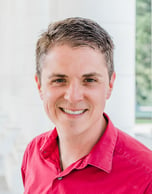The Denver chapter of Golfers Against Cancer this week named University of Colorado (CU) Cancer Center researchers Matthew Sikora, PhD, Jamie Studts, PhD, and Jenna Sopfe, MD, as the beneficiaries of three $50,000 grants for cancer research and clinical trials.
Golfers Against Cancer is a national organization founded in 1997 by a group of Houston golfers who started raising money for cancer research after losing two of their golfing buddies to the disease. The Denver chapter opened in 2009 with donations from events going to fund research at CU Cancer Center.
New understanding of ovarian cancer risk
Matthew Sikora, PhD
Sikora, assistant professor in the department of pathology at CU School of Medicine, is conducting research to better understand underlying genetic predispositions to ovarian cancer. Specifically, his team is looking at a unique genetic variant that promotes treatment resistance and tumor progression in ovarian cancer, and trying to determine how the variant increases a patient’s risk of developing ovarian cancer.
“If successful, this project can define a new genetic marker of risk for ovarian cancer, which could improve screening and lead to earlier detection,” Sikora says. “With this risk marker, we can potentially explain health disparities across racial/ethnic populations in the incidence of aggressive ovarian cancer subtypes. Importantly, we will also identify therapies that underlie the biology of the risk marker, which will unlock new precision medicine strategies for ovarian cancer.”
Improving lung cancer screening
Studts, professor in the medical oncology division and co-leader of the CU Cancer Center’s Cancer Prevention & Control Program, says the funding will support research partnerships with rural lung cancer screening programs and explore opportunities to improve access to and delivery of high quality lung cancer screening across Colorado.
Jamie Studts, PhD
Studts and his team are looking for better ways to get people at higher risk for lung cancer to come in every year for a low dose computed tomography-based lung cancer screening and to raise awareness about the screening to make it comparable to that of a colonoscopy or mammography.
“Along with our colleagues at the Moffitt Cancer Center in Florida and the LUNGevity Foundation, we have developed the Engaged Approach to Lung Cancer Screening with the goal of improving adherence to the lung cancer screening algorithm,” Studts says. “Like other cancer screening programs, lung cancer screening is a process, rather than a single event. We have adopted an implementation science perspective to test the feasibility of a new approach to lung cancer screening that emphasizes person-centered care principles and community engagement to mitigate barriers to optimal screening by facilitating adherence to the recommended screening protocol.”
The project brings together a diverse group of researchers and clinician-scientists, including CU Cancer Center member, Russ Glasgow, PhD, professor at the Division of Family Medicine and director of the Dissemination and Implementation Science Program within the Adult and Child Consortium for Health Outcomes and Delivery Science and Nina Thomas, MD, assistant professor in the Department of Medicine and director of the UCHealth Lung Cancer Screening Program. Erin Hirsh, a senior professional research assistant, and lung cancer screening expert, will serve as a collaborator and project coordinator for the research effort.
Addressing sexual dysfunction in childhood cancer survivors
Jenna Sopfe, MD
Sopfe, assistant professor in the Department of Pediatrics Section of Hematology, Oncology, and Bone Marrow Transplantation at the CU School of Medicine, is exploring the development of a standardized screening approach for sexual dysfunction in adolescent and young adult pediatric cancer survivors.
“Sexual dysfunction is estimated to occur in up to 50% of childhood cancer survivors, but it is widely underrecognized,” Sopfe says. “My long-term goal is to improve health-related quality of life in adolescent and young adult cancer survivors by improving screening, recognition, and treatment.”






